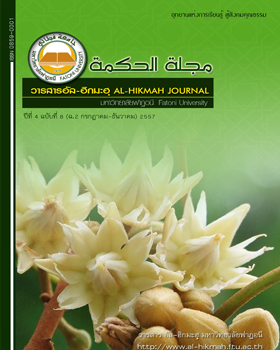ภาษาอังกฤษบูรณาการอิสลาม: วาระที่ท้าทายเพื่อการพัฒนาทักษะการอ่านของนักเรียนในโรงเรียนเอกชนสอนศาสนาอิสลามในสามจังหวัดชายแดนภาคใต้ของประเทศไทย
คำสำคัญ:
ภาษาอังกฤษบูรณาการอิสลาม, โรงเรียนเอกชนสอนศาสนาอิสลาม, ทักษะการอ่านบทคัดย่อ
บทบาทของการอ่านในการสอนภาษานั้น ควรจะให้ความสำคัญเป็นพิเศษเพราะว่า การอ่านเป็นปัจจัยที่สำคัญที่จะประสบความสำเร็จในภาษาเป้าหมายความท้าทายในการใช้บทอ่านที่มีคุณภาพที่ตอบสนองความต้องการ ของนักเรียนในสามจังหวัดชายแดนภาคใต้ของประเทศไทยนั้นยิ่งมีความซับซ้อนมากยิ่งขึ้น เมื่อพิจารณาถึงมุมมองด้านวัฒนธรรม ดังนั้นเพื่อกระตุ้นความสนใจให้นักเรียนมีความสัมพันธ์เชิงบวกในทักษะการอ่าน ครูควรได้รับการส่งเสริมให้สร้างบทอ่านที่มีการบูรณาการอิสลาม ที่สามารถพัฒนาความเข้าใจบทอ่านซึ่งสัมพันธ์กับความต้องการของนักเรียน
ดังนั้นบทอ่านของนักเรียนในโรงเรียนเอกชนสอนศาสนาอิสลามในสามจังหวัดชายแดนภาคใต้จำเป็นต้องได้รับการพัฒนา เพื่อสนองความต้องการทั้งด้านทักษะการอ่าน และด้านจิตวิญญานของนักเรียน เพื่อบรรลุวัตถุประสงค์ดังกล่าว บทความฉบับนี้พยายามอภิปรายบทบาทของบทอ่านที่บูรณาการวัฒนธรรมและความเชื่ออิสลาม เพื่อสนองความต้องการของนักเรียนในโรงเรียนเอกชนสอนศาสนาอิสลาม ในสามจังหวัดชายแดนภาคใต้ของประเทศไทย
เอกสารอ้างอิง
edu.my/
Ahmadi, M. R., & Hairul, N. I. 2012. Reciprocal teaching as an important factor of improving reading comprehension. Journal of studies in education, 2(4),153-173.
Ahmadi, M. R., & pourhossein, A. G. 2012. Reciprocal Teaching Strategies and Their Impacts on English Reading Comprehension. theory and Practice in language studies, 2(10), (pp. 2053-2060).
Alvermann, D., & Earle, J. 2003. Comprehension instruction. In A. P. Sweet, & C. Snow (Eds.), Rethinking reading comprehension (pp. 12-30). New York
Amornwich Nakornthap, 2009. Quality Assurance and Quality Issues in Thai Education: Toward Research-Driven Strategies for Improving Quality, Office of National Education Council (ONEC), Thailand
Argungu, D M. 1996. English Muslims and Islamisation: Between Needs and Deeds in English and Islam : Creative Encounters 96, proceedings of the International Conference, p. 331 – 347,
Department of English Language and Literature, International Islamic University Malaysia
Bundit Anuyahong. 2013. A Development of EFL Reading Lessons Based on Teenagers’ Problems in Thailand to Enhance Reading Proficiency of Undergraduate Students. Proceeding of Language Institute, Thammasat University, Issue 2 No.1, Thailand
Bureau of International Cooperation. 2008. Toward a Learning Society in Thailand. Ministry of Education, Bangkok.
Faruqi, I R. 1986. Toward Islamic English. International Institute of Islamic Thought Herndon, Virginia, U.S.A
J.Charles Alderson&Lyle F. Bachman. 2002. Assessing Reading. New York. Cambridge University Press
Jassem, Z.A. 1995. Islamic English: An Applied Linguistic Perspective. A paper presented at the 9th Symposium on Theoretical and Applied Linguistics, Thessaloniki, Greece.
Joseph Chinyong Liow. 2009. Islam, Education and reform in Southern Thailand: Tradition and Transformation. Institute of Southeast Asian Studies. Singapore
Ladaporn Srakang and Anchalee Jansem. 2013. A Study of Teachers’ Perceptions toward Using English Textbooks: A Case Study of 10th Grade English Teachers in Maha Sarakham Province.
Proceeding of Language Institute, Thammasat University, Issue 2 No.1, Thailand
Maryam Habibian. 2012. ESL Performance in Reading Motivation and Reading Comprehension in Democratic and Authoritarian Contexts. Journal of Social Sciences and Humanities, Volumn 7, Number 1: 74 – 85, UKM, Malaysia
Mohammad Reza Ahmadi Gilani, Hairul Nizam Ismail, Abbas Pourhossein Gilakjani, 2012 , Impacts of Learning Reading Strategy on Students’ Reading Comprehension Proficiency, The International Journal of Language Learning and Applied Linguistics World (IJLLALW) Volume 1: 78-95
Nunan, D. 1992. Collaborative language learning and teaching. New York: Cambridge University Press.
Rattana Cheewakaroon . 2011. Teaching change in response to Thai tertiary English Language teaching reform. Ph.D Research. University of Wollongong, Australia
Sayyid Muhammad. 1986 . Islamization of Linguistics. American Journal of Islamic Social Sciences Vol. 3, No.1
Shiraz Thobani . 2010 . Islam in the school Curriculum. Continuum International
Tolstefl, J. 2007. Miscue analysis in reading a second language. Cambridge:Cambridge University Press.
Soraya Rajabi and Saeed Ketabi. 2012. Aspects of Cultural Elements in Prominent English Textbooks for EFL Setting. Theory and Practice in Language Studies Volume 2, Number 4: 705-712
Thantawan Kruekaew,Phattrawan Tongkumchum, and ChamneinChoonpradub. 2008. Factors Affecting English Vocabulary Skill of Undergraduates At Prince of Songkhla University, Pattani Campus. Asian Social Science Journal. Vol.4 No.9 : 12 -16
Trabasso, T., & Bouchard, E. 2002. Teaching readers how to comprehend text strategically. In C. C. Block & M. Pressley (Eds.), Comprehension instruction: Research-based best practices (176 -202). New York:
Wenden, A., & Rubin, J. (Eds.). 1987. Learner strategies in language learning. London, UK:Prentice Hall.
Yassin. S. Marsh, D., Ong, T.E. and Ying Ying, L. 2009, Learner’s perceptions towards the teaching of Science through English in Malaysia: a quantitative analysis, International CLIL Research Journal, 1; 2, 54-69.



